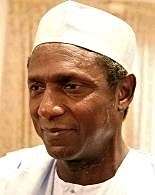Kufi

A kufi or kufi cap is a brimless, short, and rounded cap worn by men in many populations in North Africa, East Africa, Western Africa and Asia. It is also worn by men throughout the African diaspora.
African and African-American usage
In West Africa, a kufi cap is the traditional hat for men, and is part of the national costume of most of the countries in the region. It is worn by Christians, Muslims, and African Jews, although originally Islamic. Many grandfathers and other older men wear a kufi every day to symbolize their status as wise elders, religious people, or family patriarchs.[1]
Within the United States, it has become identified primarily with persons of West African heritage, who wear it to show pride in their culture, history, and religion (whether Christianity, Islam, Judaism or Traditional African religions). Often made of kente cloth, mudcloth, or knitted or crocheted in a variety of yarns.
Crown style kufis are the traditional hat worn with formal West African attire, see Dashiki.[2] A formal dashiki suit will always include a crown style kufi, while the knitted style is most appropriate for non-formal occasions. Other caps worn with the Dashiki, Senegalese kaftan, and Grand boubou, include:
- The Aso Oke hat, from Nigeria
- The Fez, a wool cap with a stem from, North Africa, also called a tarboush
- The Abeti-aja, a triangular Yoruba hat, whose name means, like the ears of a dog, from Nigeria
However, the crown style kufi is most common.
In the United States today, many African-Americans wear the kufi during weddings, funerals, graduations and Kwanzaa celebrations. Furthermore, people of mainly West African heritage of all faiths wear the kufi, although it is associated with members of the Islamic faith more.
A West African king or tribal chief may have royal or noble arms embroidered on the kufi (see Heraldry in Sub-Saharan Africa).
For members of the Christian faith, the kufi is unisex, and is also worn by women. Crochet and knitted styles are preferred by young girls and infants.
Traditionally, when worn by men, the kufi is a sign of peace, mourning, renewal or protection of the mind.
Etymology
In the Yoruba language, Ade means crown, and fila means cap. The city of Kufi is located in Yorubaland near Ibadan. Other West African names include fula, fila, and malo hat.[3] This cap is called a kofia in the Swahili language of East Africa [4] (see the kanzu article for further information). In the United States, the West African name, kufi, is most commonly used.
See also
- Smoking cap
- Kofia - cap worn in East Africa
- Taqiyah (cap)
- Fez
- Dashiki
- Women's wrapper and kaftan
- National costume
- List of hats
References
Further reading
- Thony C. Anyiam, Jumping the Broom in Style (Authorhouse 2007).
- Diane Hoyt-Goldsmith, Celebrating Kwanzaa (Holiday House 1993).
External links
-
 Media related to Kufi at Wikimedia Commons
Media related to Kufi at Wikimedia Commons